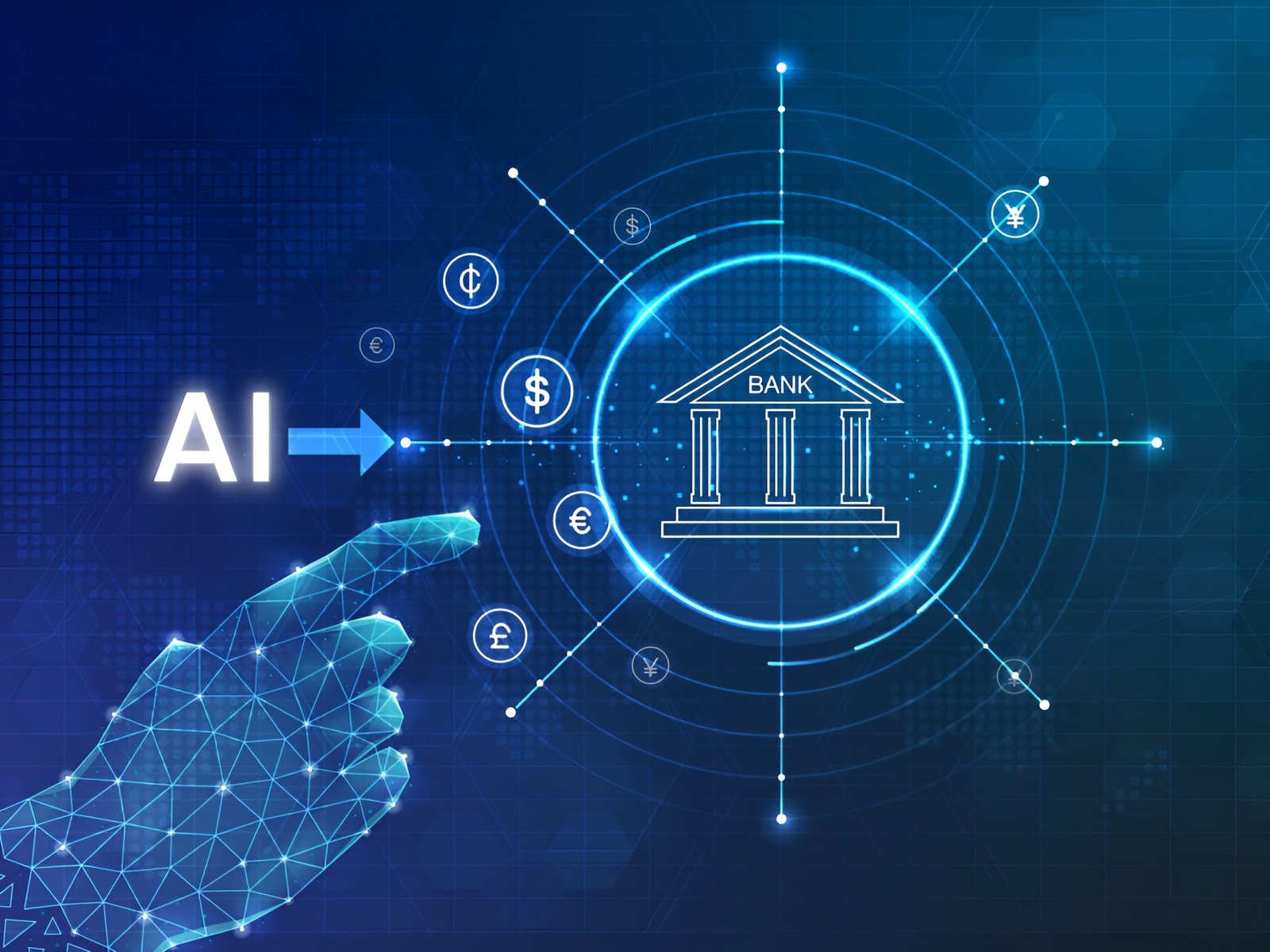
Artificial Intelligence: The Game Changer for Global Banking Affected by AI & Finance
AI & Finance
AI, the layer of technology that empowered this transformation, has finally outgrown the ability to be a futuristic concept in finance and is leading the evolution of global banking. AI can be used for everything from customer service to risk management. Financial institutions across the globe are using AI to facilitate operations, make data-based decisions, and enhance customer experience. In this article, we will look at the new-age AI trends in global banking, its advantages and challenges, and what the future of this marriage may look like.
Improving Customer Support with Artificial Intelligence
Customer Service is one of the most prominent areas where AI can be seen in banking. Banks have implemented chatbots and virtual assistants that provide customer support around the clock, solve thousands of queries every day, and eliminate customer hassles through human interaction.
Recent Advances: Consider HSBC, which recently debuted its “Amy” chatbot, which can deal with complex queries and assist with accounts. Second, JPMorgan Chase has launched COIN (Contract Intelligence), artificial intelligence software that reads commercial loan agreements. Such solutions drastically alleviate the burden on customer service representatives and provide clients with a quicker, more effective experience.
Even AI assistants are becoming more personalized. With access to individual client stats, chatbots can provide customized advice after processing large datasets, providing more personalized client interactions, from spending suggestions to investment advice.
Investment Banking AI: Create Efficiency and Insights
AI-driven innovation in investment banking is flourishing as investment banking thrives on data. Banks are constantly using AI to process vast amounts of market data, identify trends, and conduct rapid-fire investments based on updated real-time data.
Industry Insights: Goldman Sachs announced an expansion of thousands of AI-enabled projects that simplify investment decision processes. These projects enable bankers to detect market opportunities or risks in unstructured data such as social media or global news. Since it would take a human analyst much longer to cut through this massive data, such findings were difficult to find before, but AI can act as a sophisticated tool that reveals this broader context—which is possible in seconds with AI.
The endeavor exemplified by JPMorgan Chase with its tool IndexGPT, built using generative AI technology, emphasizes how investment banks are working towards employing AI to boost engagement with customers and deliver customized advice from data. AI will continue to play a role in investment banking, allowing firms to operate with greater agility in the fast-paced world of finance.
Using AI for Fraud prevention and Risk management

Fraud is an obvious one for banks that pay billions a year due to this activity. Its ability to process data in real-time makes AI all the more important in risk management and fraud detection. Armed with advanced algorithms, the technology compares new transactions to historical data, quickly identifying anomalies that may indicate a case of fraud.
Applications Artificial Intelligence algorithms to analyze patterns in transactions to detect instances of fraud. Wells Fargo, for example, has just rolled out AI solutions to run 73 million transactions and identify any suspicious behavior in real-time. These systems evolve, learning from each instance of fraud and improving their accuracy with every passing example.
Banks are protecting their customers’ assets and saving big bucks by preventing fraudulent transactions before they happen. By being proactive about detecting fraud, you build trust and credibility — something that matters more in the digital economy than ever before.
Financial Predictions and Machine Learning-Based Analytics
AI can predict future movement quicker and more accurately than conventional methods. This allows financial institutions to make informed decisions and enhance their competitive edge.
For instance, Brightwave is making waves in the domain by introducing AI-driven forecasting tools that analyze numerous data inputs, from earnings releases to SEC filings. Banks and financial institutions are using such tools to predict market shifts and provide better propositions to customers to meet their investment needs.
AI also enables evaluating client portfolios and predicting asset value fluctuations. This helps clients and banks effectively counter market volatility through predictive models for both short-term and long-term investment planning.
Use of AI To Simplify Complying with Regulations

The banking sector must comply with various regulatory requirements, which involve extensive monitoring and reporting. Failure to follow the rules can result in heavy fines, which is why regulatory oversight is essential. AI can speed up these processes and save banks time and money.
Progress: AI-driven systems can review large volumes of transactions to ensure all activities comply with regulations. This proves very useful for international banks that need to adhere to compliance requirements in various regions. For example, HSBC uses artificial intelligence to automatically check that transactions comply with regulations worldwide.
These AI-driven compliance tools ensure that compliance is much easier, faster, and more accurate than a manual process. For example, these tools help combat financial crimes such as money laundering by scanning data trends that indicate some illegal behavior.
How AI Will Shape Wealth Management and Individual Financial Advice
Wealth management firms also use AI to provide personalized investment advice based on the client’s specific data. Banks can track a client’s financial behavior, preferences, and goals with machine learning algorithms to give them more personalized advice.
Recent Developments: Wealthfront, an American-based financial advisor, is using AI to tailor investment plans for its customers. Likewise, the Morgan Stanley AI assistant Debrief helps advisors by automating tasks, freeing them to provide clients with insight into strategy, not functions. Incorporating AI in this manner leads to improved client experience and fosters trust in relationships.
The ability of AI to process huge datasets and optimize findable solutions gives wealth management firms a competitive edge, allowing them to provide data-driven advice that is both bespoke and timely.
Credit Scoring and Financial Inclusion with AI
Many customers, including the elderly, young adults, and people from underserved communities, may not have a well-established credit history or any credit history at all, which excludes them from traditional credit scoring. ALTERNATE DATA: AI bridges this gap by utilizing other data sources to assess creditworthiness and bring financial services to a wider population.
For instance, firms like Upstart have created artificial intelligence-based credit models that take into account nontraditional data to determine an individual’s credit risk, such as education or employment history. This way, banks can grant credit to clients who are normally excluded from traditional financial services, resulting in fairer credit scoring.
AI also aids in financial inclusion, which is becoming a broader focus among banks looking to expand in emerging markets by making credit more accessible.
Biases, Ethics, and the More Important Problem of AI Systems
Despite these advantages, AI also requires some ethical concerns, especially about data privacy and algorithmic bias. Many AI models are trained on historical data, which may contain inbuilt biases that lead to skewed or unjust decisions, such as in credit scoring or hiring.
Challenge: Trust in AI-based models relies heavily on fairness. Banks need to be careful when analyzing their algorithms for bias and transparency. In that vein, Bank of America is conducting internal reviews to ensure its AI apps comply with ethical principles and deliver fair services to all customers.
Data privacy is a third vital factor, and digital banking is gaining popularity daily. This means that banks need to protect customer information, and hence, their AI applications need to develop a robust data protection mechanism.
Artificial Intelligence Impact on Jobs in the Banking Sector

The one aspect of AI that has been most debated in banking is whether it will result in a loss of jobs. AI does act to eliminate certain tasks and potentially replace some jobs, but it will inevitably create new roles that actively involve the management, ethics, and programming of AI.
Industry Perspective: Citigroup estimated that AI may increase bank profits by $170 billion over five years. That said, this resurgence in profitability might come at the cost of delivering certain job functions, mostly the routine ones. However, many financial institutions consider AI a human augmenter rather than a human replacer, allowing employees to focus on high-level strategic decision-making.
Banks such as UBS and Deutsche Bank in the West are already getting advanced stuff such as AI-driven work environments by reskilling employees. This transition also indicates a move away from certain positions being taken over by automation to others that will follow and be more focused on the control and optimization of that AI.
The Future: How AI Will Shape the Future of Global Banking
With the future in mind, the impact of AI on banking will continue to grow. Exciting developments like quantum computing in the near future can make AI even more powerful tools for data processing and predictive modeling.
Banks will probably use more mature AI models, blending data to provide even more tailored solutions. We might also see the rise of an AI-powered advisory platform that can cater to the customer’s financial needs—from budgeting to investment.
Conclusion
AI is reshaping the global banking industry. AI offers some of the most substantive benefits, from automating customer service to designing a seamless transmission for compliance and risk management. Even so, these advantages have their issues, especially in applying the concept to a modern workforce and ensuring professional ethics accompany artificial intelligence. Financial services must strike a balance between the efficiencies AI can unlock and a commitment to transparency, fairness, and data privacy.
The implications of AI for global banking are now becoming all too clear. Financial companies have to harness the power of AI innovations while being proactive about regulatory, ethical, and job-related issues. In this way, they will be able to utilize AI’s full potential, providing a more efficient, inclusive, and secure banking ecosystem for clients across the globe.
For more related news visit Dailyforesight



